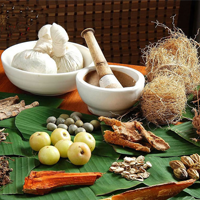The Propagator of Ayurveda on Earth
Lord Dhanwanthari- The God of Medicine- The Propagator of Ayurveda on Earth
Who was Lord Dhanwanthari?

As per early recordings and legends, Lord Dhanwanthari is regarded as the God of Medicine and is an incarnation of Lord Vishnu who first appeared to deliver the divine nectar to the Devas during the battle for supremacy between the Devas and the Asuras, the demons.
Later, he is said to have appeared as a human being to impart the teachings of the Science of Ayurveda to the people on earth.
The birth of Ayurveda on earth
Mapping out the beginning of the ancient curative Science, Ayurveda is intertwined in celestial intervention. This 'Science of Life and Longevity' is definitely eternal, infinite and is passed on from generation to generation. A healing system that was adopted by the gods, lords, sages, kings and even the common man from times immemorial, Lord Dhanwanthari, the God of Medicine has been credited to bringing the Ayurvedic tradition and practices to earth.
Therefore, we can associate spirituality to Ayurveda as it is definitely a Spiritual discipline. And this is evident in the very core structure of the principles of Ayurveda. It has not changed or altered. Its essence has been preserved intact to date and that is its specialty and uniqueness. And this legendary, historically-rich tradition is revered and followed austerely wherever it is practiced.
When and where did Lord Dhanwanthari first appear?
In fact, the 'Puranas' or Hindu mythology records that Lord Dhanwanthari, an incarnation or avatar of Lord Vishnu first appeared here on earth during the famous episode of the churning of the 'Ksheera Sagara', a celestial ocean of milk by the 'Devas' and the 'Asuras' to acquire the divine nectar that would guarantee immortality. And his purpose here on earth was to deliver 'Amritham' or the heavenly nectar of immortality to the 'Devas' so that they could be invigorated and nourished and would never grow old, blessed with eternal power.

As the churning continued, it is said that a young, gentle and handsome person appeared. His features were chiseled, strong and everyone was captivated by his appearance. He was adorned with jewellery and regaled in all finery. He had four hands in which he held the most important, celestial nectar, 'Amritham' in a pot, a celestial conch 'Shankhu' in another. And in the other two hands he held the divine, famed and all-powerful weapon,'Sudarshana Chakra'and'Jalooka', a leech in another. A leech represents or depicts removing anything that is harmful. And here it personifies cure, treatment and removal of illnesses and infections.
How is his second appearance on earth recorded?
"kasyasya kasis tat-putro rastro dirghatamah-pita dhanvantarir dirghatamasa ayur-veda-pravartakah yajna-bhug vasudevamsah smrta-matrarti-nasanah"

Tracing through the legends, the above shloka or hymn in Sanskrit talks about Lord Dhanwantari. Kasya's son was Kasi. And Kasi's son was Raṣṭra who was in turn the father of Dirghatama. And Dirghatama's son was Dhanvantari who took birth in the 600 BC, who was considered as the God of medicine and was believed to be an avatar of Lord Vishnu. One who remembers the name of Dhanvantari can be released from all disease.
In his second appearance on earth he was regarded as Kasi-raja Dhivodasa. As a child itself he adopted an ascetic lifestyle and imparted teachings about the ancient Science of health, Ayurveda. He imparted his teachings to many rishis or sages, sadhus or seers who became his devout disciples. All his teachings were composed as texts. And it was divided widely into 8 divisions or Ashtangas. And one among his prominent disciples was Charaka who composed these texts in his book, 'Charaka Samhita'.
How do we remember and revere Lord Dhanwantari
The belief is that if we intensely pray and surrender ourselves to Lord Dhanwantari who is the God of Medicine, we will be rid of our illnesses. Also if we were to ardently chant the hymn, smritha-matrarti-nasanah, we would be rendered disease-free.
And to celebrate and commemorate the Lord and his valuable teachings about Ayurveda that is wholesome, natural and complete with curative and preventative measures, every year, during Diwali, the 'Festival of Lights' on the Dhanteras day, people, physicians and practitioners remember and pay tributes to him. Lighting a lamp that is pointed in the North-east direction, placed at the doorstep of every home is suggestive of inviting Lord Dhanwanthari into our homes to bless us with health and contentment. This day is also known as Dhanwantari Trayodashi, or Dhantrayodashi. And the saying, 'Health is Wealth' sums it up perfectly.
The Nelluvai Sree Dhanwanthari Temple- A brief intro

In India, there are many important and ancient temples dedicated to Lord Dhanwanthari, the God of Medicine. Even in Kerala, 'Gods own country', there are a couple temples that are devoted to Lord Dhanwanthari. They are located in Thottuva, Prayikkara, Maruthorvattom and Nelluvai. The Sree Dhanwanthari temple at Nelluvai is near Wadakkanchery in Thrissur district, Kerala.

As the legend goes, it is said that the Ashwini Devas installed the idol in this temple. This very same idol was supposedly worshipped by Shri Vasudevar during an earlier yuga or an era or epoch on earth which was many thousands of years earlier. Therefore, it is inferred that the origins of the temple and the idol dates back to more than 5000 years ago which makes it a historically significant place of sorts.
The idol, the God of Medicine holding a leech is representative of the leech therapy employed in Ayurveda, wherein a leech is used to suck out the bad blood from an infected area of the body and this helps cure infections. And therefore, most doctors and physicians do worship Lord Dhanwanthari before they embark on their respective careers or professions. And here in this temple, it is said that many famous Ayurvedic physicians have performed pujas or prayer rituals and sung bhajans or devotional songs before they started out.
Coincidentally, the Ayurvedic healthcare resort, Ayuryogashram near Thrissur in Kerala is just a few kilometers away from the Nelluvai, Dhanwanthari Temple. And this could be considered a happenstance as Ayuryogashram offers Ayurvedic therapies and treatments. And Lord Dhanwanthari is the God of Medicine who is said to have brought Ayurveda to earth. And for a resident guest, it helps complete their journey to experience rejuvenation and relaxation at Ayuryogashram and which culminates with a visit undertaken to this ancient, revered temple in the neighbourhood.



























